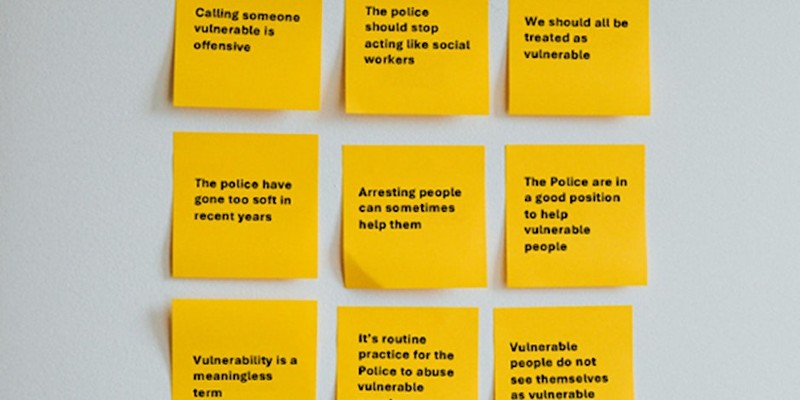
Viewpoints on vulnerability as a focus for policing and public services
This event has now finished.
Event details
Vulnerability & Policing Futures Research Centre webinar
After a period of sustained austerity, vulnerability is arguably receiving more focus than ever before in policing and other public services. Yet responding to people based on their vulnerability can be controversial. What are the impacts of how vulnerability is used in the work of policing and other services? How can we improve service responses to those deemed vulnerable?
In this webinar, our researchers will delve into these questions, presenting findings from a new Vulnerability & Policing Futures Research Centre research project exploring the value and implications of vulnerability as a focus for policing and public services.
The research used ‘Q methodology’, a research technique that combines qualitative and quantitative methods to uncover shared and differing perspectives on contested issues. By capturing diverse viewpoints from police, partner service providers and people who access services in the city of Bradford, the team identified three distinctive viewpoints about vulnerability and public service responses.
The study’s results reveal strongly-held views about whether police and other services succeed in supporting ‘vulnerable’ people and varied perspectives about what the role of the police and partner agencies should be in this work. The findings shed light on where the deficits and barriers are in addressing vulnerability. In an age of increasingly fractured perspectives on social issues, could engaging more with prominent viewpoints on vulnerability and policing help improve responses to situations of harm?
About the speakers
- Professor Kate Brown (University of York, Vulnerability & Policing Futures Research Centre Deputy Director)
- Professor Adam Crawford (University of York and University of Leeds, Vulnerability & Policing Futures Research Centre Co-Director)
- Dr Chris Devany (University of York, Vulnerability & Policing Futures Research Centre Postdoctoral Researcher)
- Dr Öznur Yardımcı (University of York, Vulnerability & Policing Futures Research Centre Postdoctoral Researcher)
- Chair: Dr Isabelle Bartkowiak-Theron (University of Tasmania)
